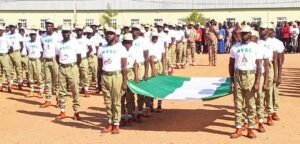
North-East women move to reclaim political power ahead of 2027
By Ahmed Ahmed
Women across the North-East region have been encouraged to rise, reclaim their political space, and lead the transformation of their communities, as stakeholders gathered in Gombe State for the 2025 North-East Women in Political Parties Summit.
The two-day summit, organised by LEADTOTS Development Initiative with support from the National Endowment for Democracy, brought together women political leaders, representatives of INEC, members of the Inter-Party Advisory Council (IPAC), and peer support networks across the region.
Declaring the summit open, Executive Director of LEADTOTS, Nicholas Oshojah Afeso, said empowering women to take active roles in politics is critical to rebuilding the North-East.
According to him, the summit was designed to strengthen women’s political participation, challenge patriarchal structures, and equip them with skills to pursue leadership roles.
Afeso noted that the gathering was not “just another meeting,” but a strategic movement aimed at reshaping the region’s political culture.
“We convene 60 exceptional women leaders because we envision a Northeast where women are not only voters or mobilisers, but candidates, decision-makers, negotiators, and power brokers,” he stated.
He further disclosed that the summit would co-create the first-ever Northeast Women Political Charter (2025–2027) to guide collective action in the coming years.
Key thematic discussions at the summit include breaking patriarchy, financing political ambitions, building issue-based campaigns, and forming stronger alliances among women. Participants were encouraged to approach the 2027 elections with unity and confidence.
However, several speakers raised concerns about persistent barriers limiting women’s political advancement. Yobe State PDP Women Leader, Hauwa Gana Ibrahim, lamented the shrinking number of women serving as party delegates, an issue she said significantly weakens their influence during primary elections.
She explained that a recent law requiring party executives to contest for delegate positions has further disadvantaged women, many of whom face financial constraints.
INEC’s Head of Voter Education and Publicity in Gombe State, Rifkatu Maxwell, echoed these concerns, saying the delegate selection process in political parties overwhelmingly favours men.
She urged women to support female candidates in the 2027 polls regardless of party affiliations, arguing that women—who constitute a higher percentage of registered voters have the numerical strength to reshape political outcomes.
Maxwell also revealed that a bill before the National Assembly seeks to reserve one Senate seat per state for women, alongside at least three seats in state assemblies.
She called on political parties to complement these efforts by offering free nomination forms to female aspirants, similar to INEC’s practice.
Women’s rights advocate, Halima Mahdi, stressed that the persistent lack of women delegates continues to hinder female candidates from securing party tickets.
She challenged the summit participants to mobilise aggressively ahead of 2027 to reverse this trend and ensure stronger representation for women across the region.
The summit ended with renewed calls for collective action, unity, and resilience as women in the North-East prepare to confront long-standing structural barriers and assert their place in the political arena.


